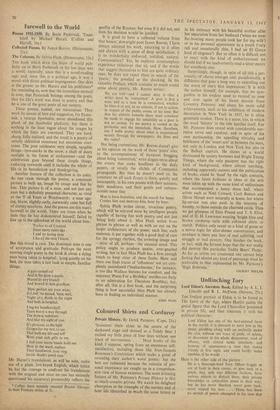Farewell to the World
The Colossus. By Sylvia Plath. (Heinemann, 15s.) THE book which drew the blaze of world pub- licity on to Boris Pasternak in his last days was a novel; naturally, since this is a novel-reading age; and, since this is a political age, it was a novel with direct political impingement. Our debt is the greater to Mr. Harari and his publishers* for reminding us, now that the immediate turmoil is over, that Pasternak belongs among the poets, that his life's work was done in poetry and that be is one of the great poets of our century.
These poems, indeed, are miraculous. They work by means of hint and suggestion, for Paster- nak, a veteran Symbolist, never abandoned this plank of the Symbolist platform; but there is nothing in the least vague about the images by which the hints are conveyed. They are hard, sharp, fully realised, and the result is a poetry of strictly delimited statement but enormous over- tones. The poet celebrates very simple, tangible things—tyre-marks in the snow, a shaft of dusty sunlight in the forest at midsummer--and the celebration goes beyond these simple things, radiating outwards until it includes the whole of life in its benediction and thanksgiving.
Another feature of the collection is its unity. As one reads through the poems, a consistent picture is built up, image by image and line by line. This picture is of a man, and not just any man but a definitely presented character, as vivid as the 'I' of Yeats or Wordsworth: a man age- ing, brave, slightly surly, outwardly calm but full of stormy emotions. And the poems are this man's farewell to the world. There are times when he feels that he has dishonoured himself, failed to live up to the splendour of the world about him:
Traitor to all I trusted Since many years ago I end by losing man Like all the men I know.
But this mood is rare. The dominant note is one of acceptance and gratitude. Perhaps the most moving single poem in the book is about a dying man being taken to hospital: lying quietly on his bed, the man takes a last look at simple, familiar things.
A gate turned red And in the glow a maple Waved its wry branch And bowed to him goodbye.
'How perfect are your ways, 0 Lord,' he mused, 'men. wall, Night city, death in the night
And beds in hospital.
I tug my handkerchief;
Tears worry a way through The drowsy sedatives And blur my sight of you.
It's pleasant, as the light Gropes for my bed, to see That both my life and self Were your rich gifts to me.
I feel your warm hands hold me
Here in the ward, replace Their handiwork, your ring Inside death's jewel case.'
Mr. Harari's translations, as will be seen, make use of a plain, low-keyed English, which (since he has the courage to confront his translations with the original and since no one has seriously questioned his accuracy) presumably reflects the
*Collins have recently reissued Doctor Zhivago in their Fontana series, at 5s. .quality of the Russian; but even if it did not, one feels his decision would be justified.
It is good to have a collected volume from
that honest, downright poet James Reeves. I have
always, admired his work, returning to it often and always with a sense of deep satisfaction; it is so wonderfully unforced, unfaked, natural.
Commonplace? Yes, he explores commonplace
experience (whatever that is), and if the words
that suggest themselves to him are quite ordinary ones, he does not reject them in search of the 'poetic,' the jewelled or the shocking. In his valuable Preface, which contains so much sound
sense about poetry, Mr. Reeves writes: We are told—and I cannot deny it—that a writer must be 'committed.' A poet is first a man, and as a man he is committed, whether he likes it or not, to an attitude, if not to action, in respect of the public events of his time. But that his attitude towards these must somehow he made to engage his sensibility as a poet is not so certain. To me poetry is rooted in the particular and the immediate. How, therefore, can I write poetry about what is experienced mainly through the newspapers, the films and the radio?
Not being contentious, Mr. Reeves doesn't give us his opinion on the work of those 'poets' who, to the accompaniment of incessant bragging about being 'committed,' write slogan-verse about the events that make headlines in the daily papers, or versify the clichds of Communist propaganda. But then he doesn't need to; the comment on all such ErsatZ is there, quietly and inescapably, in his own poems with their sureness, their steadiness, and their gentle and compas- sionate sense that Man is born homeless, and the search for home
Creates him and destroys him, hour by hour.
Sylvia Plath writes clever, vivacious poetry, which will be enjoyed most by intelligent people capable of having fun with poetry and not just being holy about it. Miss Plath writes from
• phrase. to phrase as well as with an eye on the larger architecture of the poem; each line, each sentence, is put together with a good deal of care for the springy rhythm, the arresting image and —most of all, perhaps—the unusual word. This policy ought to produce quaint, over-gnarled writing, but in fact Miss Plath has a firm enough touch to keep clear of these faults. Here and there one finds traces of 'influences' not yet com- pletely assimilated ('Snakecharmer,' for instance. is too like Wallace Stevens for comfort, and the sequence 'Poem For a Birthday' testifies too flatly to an admiration for Theodore Roethke), but, after all, this is a first book, and the surprising thing is how successful Miss Plath has already been in finding an individual manner.
JOHN WAIN


































 Previous page
Previous page